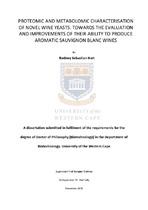| dc.contributor.advisor | Ndimba, Bongani | |
| dc.contributor.advisor | Jolly, Neil | |
| dc.contributor.author | Hart, Rodney Sebastian | |
| dc.date.accessioned | 2018-04-10T12:44:56Z | |
| dc.date.available | 2018-04-10T12:44:56Z | |
| dc.date.issued | 2017 | |
| dc.identifier.uri | http://hdl.handle.net/11394/5913 | |
| dc.description | Philosophiae Doctor - PhD (Biotechnology) | |
| dc.description.abstract | Wine yeast Saccharomyces cerevisiae and wild yeasts e.g. Torulaspora delbrueckii forms an integral
part of wine production by converting relatively 'neutral' flavoured Sauvignon blanc grape must into
varietal aromatic wines. Yeast derived and mediated metabolites which contribute to Sauvignon blanc
wine aroma and flavour, are regulated by yeast proteins (enzymes) that are differentially expressed
during the course of fermentation. Inoculation with an appropriate yeast strain can, therefore, increase
commercial wines sales as resultant wines will have sought-after aromas and flavours. Likewise,
inoculation with the incorrect strain can have an undesirable effect on wine quality. Subsequently, the
development of yeasts for the production of varietal aromatic Sauvignon blanc with lower volatile
acidity (VA) was also identified as a South African industry priority. Although genetic modification can
address this, the use of genetically modified organisms (GMO) is illegal. | |
| dc.language.iso | en | |
| dc.publisher | University of the Western Cape | |
| dc.title | Proteomic and metabolomic characterisation of novel wine yeasts: towards the evaluation and improvements of their ability to produce aromatic sauvignon blanc wines | |
| dc.rights.holder | University of the Western Cape | |

